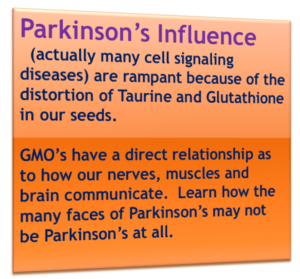Many Faces of Parkinson's
Parkinson's disease is a degenerative disorder of the central nervous system that impairs motor skills, cognitive processes, and other functions. The most obvious symptoms are motor-related, including tremor, rigidity, slowness of movement, and postural instability. Among non-motor symptoms are autonomic dysfunction and sensory and sleep difficulties. Cognitive and neurobehavioral problems, including dementia, are common in the advanced stages of the disease. PD usually appears around the age of 60, although there are young-onset cases.

◊ Tremor: Estimates of how many people with PD develop tremors range from 69% - 100%. Of those who do develop tremors, only a few develop tremors that are disabling. The tremor is usually most pronounced at rest. Tremors often start on one side of the body — usually with the hand — but may also involve the arms, feet, legs, and chin.
◊ Slow Movement (bradykinesia), Loss of Movement (akinesia): Slowness occurs in 77% - 98% of those diagnosed with PD. Some individuals also experience episodes of "freezing" where they cannot move for several seconds or minutes. This is often called an "on-off" symptom.
◊ Balance and Walking Problems: These may result in a stooped appearance and shuffling gait and can cause falls. Most people do not develop postural problems until many years after they have been diagnosed.
◊ Rigidity or Stiffness: In addition to making movement difficult, stiffness can also cause muscle ache and muscles may tire easily. The number of people with PD who experience rigidity is estimated to be between 89% - 99%. BioAcoustically speaking, Rigidity and Stiffness are related to the inability to use glycine, genetically or nutritionally.
 Diagnosis of Parkinson’s Disease
Diagnosis of Parkinson’s Disease
A number of disorders can cause symptoms similar to those of Parkinson's disease. People with Parkinson's-like symptoms that result from other causes are sometimes said to have parkinsonism. While these disorders initially may be misdiagnosed as Parkinson's, certain medical tests, as well as response to drug treatment, may help to distinguish them from Parkinson's. Since many other diseases have similar features but require different treatments, it is important to make an exact diagnosis as soon as possible.
There are currently no blood or laboratory tests to diagnose nongenetic cases of Parkinson's disease. Diagnosis is based on a person's medical history and a neurological examination. Improvement after initiating medication is another important hallmark of Parkinson's disease.
Pursuing the Influence of Parkinson's Disease
Many people realize that our conventional industry of dis-ease may not always have the people's desire for improved health as its main objective or intent.
With this in mind, Sharry Edwards and the Sound Health Portal team are offering you a free preliminary vocal analysis - A limited time opportunity!
Sound Health Portal is strictly a news and information website about wellness topics. It does not provide medical advice, diagnosis or treatment. This content is not intended to be a substitute for professional medical advice, diagnosis, or treatment. Always seek the advice of your physician or another qualified health provider with any questions you may have regarding a medical condition. Never disregard professional medical advice or delay in seeking it because of something you have read on this website.